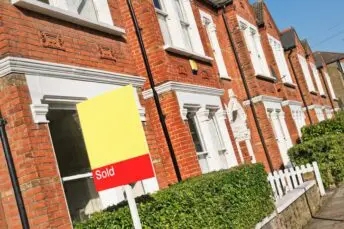House Price Index Jan 2026
The start of 2026 has had a modest uptick in house prices and buyer demand. While conditions vary by area, the market is broadly considered to be a buyer's market, with the availability of homes for sale at an eight-year high. Affordability has improved over the past year as wage growth outpaced price growth and mortgage rates have steadily declined; supporting expectations of stronger activity in the months ahead.
What’s happening nationally
House prices are up on average +0.1% this month and +1.5% in the past year.
House prices have increased slightly over the past month +0.1% on average across the indices. Land Registry reporting December figures noted a fall of -0.7%, Nationwide +0.3% in January, Halifax +0.7% in January and Rightmove reporting January asking saw a sharp rise of +2.8% (after falls of -1.8% in November and December). Rightmove isn’t included in our average change as they report on asking prices not sold prices.
Annual house price growth is also up to 1.5% up from 1.1% last month. The indices report the following shifts in annual house price growth over the past month: Land Registry (2.4% vs 2.5%), Nationwide (1% vs 0.6%), Halifax (1% vs 0.3%) and Rightmove reporting asking prices (0.5% vs -0.6%).
Indices based on:
Land Registry – registered property transactions in December.
Nationwide & Halifax – mortgage valuations in January.
Rightmove – asking prices posted on Rightmove in January.
*Rightmove is not included in the index average as the basis for its index is different (asking price vs agreed sale price)
| Index reports: | Monthly change | Annual change |
|---|---|---|
| Land registry | -0.7% | +2.4% |
| Nationwide | +0.3% | +1.0% |
| Halifax | +0.7% | +1.0% |
| Rightmove | +2.8% | +0.5% |
| Average change | +0.1% | +1.5% |
House prices in your area
Regional house prices
In the UK, house prices have increased the fastest in Northern Ireland (+7.5%), Wales (+5%), Scotland (+4.9%), the North East (+4.6%) and the North West (+4.5%).
House price inflation has been lower in England generally (+1.7%). Areas in England with a fall or slowest growth in house prices include: London (-1.0%), the South East (0%) and South West (+0.3%).
Most expensive/ cheapest areas
In terms of average house price, the most expensive regions in the UK remain London (£551K), the South East (£378K) and the East of England (£338K). The cheapest regions are the North East of England (£165K), Northern Ireland (£195K), Scotland (£191K), Yorkshire & Humber (£209K) and Wales (£215K).
In terms of cities, the most affordable are: Aberdeen (£133K), Glasgow (£163K), Newcastle (£162K) and Sheffield (£177K). And, the most expensive cities in the UK are: London (£526K), Cambridge (£462K), Oxford (£448K), Bristol (£341K) and Bournemouth (£317K).
Prices by property type
House prices shifted in the last year for detached (+1.6%), semi-detached (+3.9%), terraced (+3.6%) properties and for flats/ maisonettes (-0.5%).
| UK Region | Average price £ | Monthly change | Annual change |
|---|---|---|---|
| England | |||
| Nothern Ireland | |||
| Scotland | |||
| Wales | |||
| North West | |||
| Yorkshire and The Humber | |||
| North East | |||
| West Midlands | |||
| East Midlands | |||
| South West | |||
| East of England | |||
| South East | |||
| London |
| UK City | Average price | Annual change |
|---|---|---|
Market Monitor
2025 transactions were just over 1.2m transactions. This is 10% higher than 2024 transactions.
December 2025 transactions of 100K are steady vs November (100k) and up 5% on transactions last December (96K).
Buyer demand starting to recover, homes for sale at 8 year high and time to sell increases.
In the first month of 2026, buyer demand was reported by Rightmove and Zoopla to be improving but below the fast start of 2025. RICS reports that buyer demand remained down (but less negative) and new seller instructions held steady. Zoopla reports that the total number of homes for sale is 6% higher than last year – the highest level seen in eight years. This means buyers have more choice, and sellers face more competition.
The average time to secure a buyer increased to 81 days from 76 days in December according to Rightmove; above the 2025 average (which is 66 days).
How busy is the market?
- Not busy
- Normal
- Very busy
- Transactions in December are steady
- Total transactions in December 2025 100K
- +0% versus last month
- +5% higher than last year
Homes for sale vs homebuyers
- Good availability of homes
- Normal
- Shortage of homes
- Buyer enquiries fall (-19% RICS Jan data) less negative but 7th successive monthly fall
- Seller instructions steady (1% RICS Dec data) unchanged
- Average stock per agent 56 in January steady (incl under offer/ Sold STC Rightmove)
Average speed of sale
- Fast
- Normal
- Slow
- Jan figure: 81 days to find a buyer, up from 74 days last month; above year to date average of 66 days (Rightmove)
What the experts say
Rightmove

“It’s an encouraging start to the year to see sellers confident enough to list their homes at higher prices after several months of muted price growth last year, coinciding with more potential buyers returning to market. Some buyers, particularly first-time buyers, won’t want to see prices rising too quickly. However, asking prices are only back to where they were in the summer of 2025 before the Budget rumours began surfacing, which unsettled the market and dented confidence. This new year seller confidence is a good sign, but sellers would do well to listen to the guidance of their agent when setting their asking price and avoid being over-optimistic. There’s a twelve-year high number of homes for sale for this time of year, so buyers have lots of choice, and a third of properties that were already on the market for sale have had a price reduction. This means that sellers need to be realistic and balance the price they want to achieve with the likelihood of being able to find a buyer in their local market at that price.”
Nationwide

“The start of 2026 saw a slight pick-up in annual house price growth, which rose to 1.0% in January, after slowing to 0.6% in December. Prices increased by 0.3% month on month in January, after taking account of seasonal effects. Housing market activity also dipped at the end of 2025, most likely reflecting uncertainty around potential property tax changes ahead of the Budget. Nevertheless, the number of mortgages approved for house purchase remained close to the levels prevailing before the pandemic. Housing market activity is likely to recover in the coming quarters, especially if the improving affordability trend seen last is maintained. Affordability constraints have eased over the past year, thanks to earnings growth outpacing house price growth and also a steady decline in mortgage rates. This has helped underpin buyer demand, with first-time buyer activity over the last year continuing to edge higher as a share of house purchases.”
Zoopla (Hometrack)

“Buyer demand has picked up at the start of the year as confidence returns following Budget uncertainty in late 2025. The start to the year mirrors that of 2024, but demand is 9% lower than the very busy start to last year when buyers were rushing to beat the ending of stamp duty relief in April. While market activity is improving, higher levels of supply – the total number of homes for sale is 6% higher than last year, and the highest level seen in eight years — means buyers have more choice, and sellers face more competition. Pricing and presentation are more important than ever for sellers.”
Halifax

“The housing market entered 2026 on a steady footing, with average prices rising by +0.7% in January, more than reversing the -0.5% fall seen December. Annual growth also edged higher to +1.0%, pushing the cost of the typical UK home above £300,000 for the first time. While that’s undoubtedly a milestone figure, and activity levels show a resilient market, affordability remains a challenge for many would-be buyers. Broader economic conditions continue to provide some support. Wage growth has been outpacing property price inflation since late 2022, steadily improving underlying affordability. That’s a positive trend for buyers, and the long-term health of the market. And we’re now seeing more mortgage deals below 4%. If inflation continues to ease, there should be further gradual reductions as the year goes on.”
RICS

“The January 2026 RICS Residential Market Survey suggests market conditions may be starting to turn a corner, with several activity-related indicators recording their least negative readings for several months. Furthermore, while near-term expectations remain relatively cautious, there is growing conviction among respondents that a recovery in sales volumes will gather momentum over the year ahead.”



